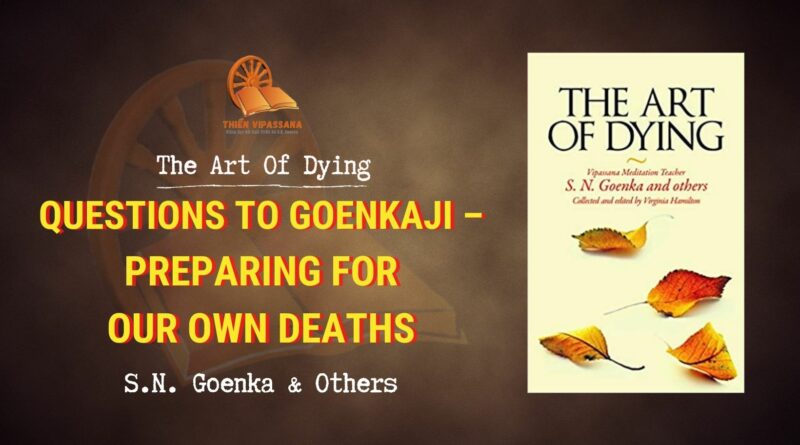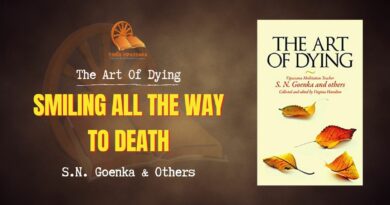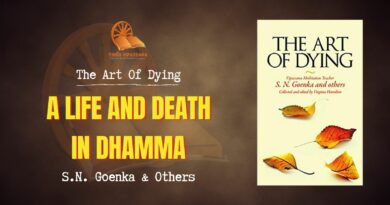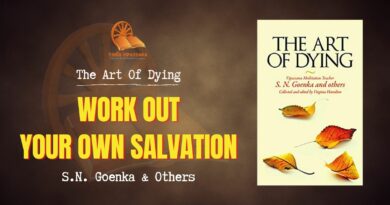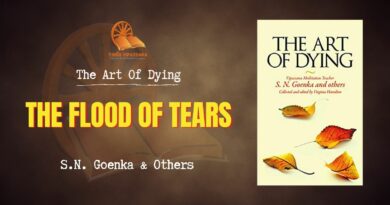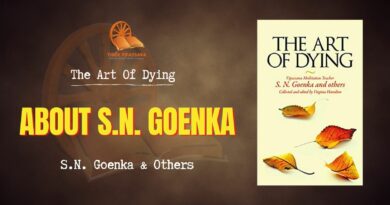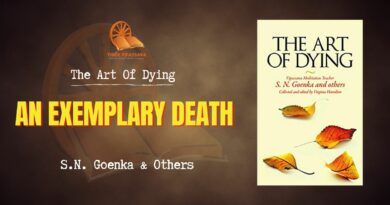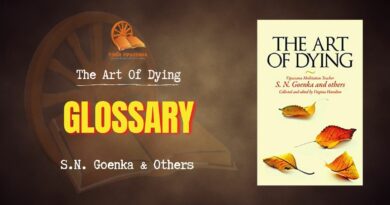Questions to Goenkaji
Preparing for Our Own Deaths
Student: Can any lessons be learned from the way the Buddha or his followers died?
Goenkaji: The Buddha died smilingly, giving Dhamma—a Vipassana lesson for everyone.
The Buddha was a teacher. He had the determination to give Dhamma until his last breath—and so he did. As he was dying someone came to see him, but his long-time attendant Ānanda stopped him, saying, “No, this is not the time.” Overhearing him, the Buddha said, “No. Bring him, Ānanda. Bring him.” His volition, his compassion was so great that he didn’t care about his own pain at the time of death. He knew he had to give Dhamma to this person who otherwise might miss it. Compassion is an important quality to develop for those who are teaching.
I would like to know where we should place our attention a few hours before dying, and then where at the moment of death?
You want to be aware of sensations and anicca all the time. By the practice of Vipassana you learn the art of living, and you learn the art of dying. If you have been practicing Vipassana regularly, then at the time of death you will automatically become fully aware of your sensations and anicca, and die very peacefully. You cannot die unconscious, crying, or in fear; you pass away smiling and observing sensations. So not only is this life secured, the next life is also secured.
Some people recommend that, before dying, we recollect our previous good deeds, merits like dāna and sīla, that we have accumulated. Since we are still far away from nibbāna, perhaps this might lead us toward a devā loka, a heavenly plane. Should we try to go to a heavenly plane?
For people who have never practiced Vipassana, never practiced anicca, this is a proper thing for them to do—to remember their good deeds, which will take them to higher lokas or fields of existence. But if you practice Vipassana and anicca, you should work with anicca and you will also go to a heavenly loka if you are not yet ready for nibbāna. More time might still be needed before you reach nibbāna, so you will go to a heavenly loka where you will be able to continue your practice on your own without a teacher. Because you die with a mind observing anicca, you’ll be born with a mind observing anicca, and you will continue to practice Vipassana.
Many people who come to the courses say, “Since childhood I have felt these sensations; I didn’t know what they were.” It is because that person has been practicing in the past. So this practice will go with you.
If negative thoughts are arising and we are meditating equanimously, and death comes at that moment, what loka will we go to?
Even while negative thoughts are arising, at the moment of death sensations will arise immediately and automatically, and if you are practicing Vipassana you will be observing them. After death you will not go to lower fields of existence, because in the lower fields you cannot practice Vipassana with awareness of anicca.
You need not worry. Only if you stop practicing Vipassana will there be a need for worry. If you keep practicing regularly morning and evening, then automatically at the time of death sensations will arise—there is no doubt about that. No one practicing Vipassana needs to fear death—you will be promoted!
If you practice Vipassana, death will certainly occur in a positive way.
How can we know whether there is a past life, or life after death, without personal experience?
It is not necessary to believe in a past or future life for Vipassana to help you. Surely you must believe in this present life. Many people come to courses not believing in past or future lives—it doesn’t matter. Give all importance to the reality of this moment: At this moment you are dying—every moment you are dying, every moment taking new birth. Observe that, feel that, understand that. Also understand how you react to this changing flow, and thereby harm yourself. When you stop reacting, the present becomes better and better. If there is a future life, certainly you will benefit there as well. If there is no future life, why worry? You have done your best to improve your present life. The future is nothing but the product of the present. If the present is alright, the future will be alright.
Sabbadānaṃ dhammadānaṃ jināti;
sabbarasaṃ dhammaraso jināti;
sabbaratiṃ dhammarati jināti;
taṇhakkhayosabbadukkhaṃ jināti.
The gift of Dhamma triumphs over all other gifts; the taste of Dhamma triumphs over all other tastes;
the happiness of Dhamma triumphs over all other pleasures; the eradication of craving triumphs over all suffering.
—Dhammapada 24.354
Do not waste the time you have left. This is the time for you to strive with energy and steadfastness. You can be sure that you will die, but you can’t be sure how much longer you have to live.
—Venerable Webu Sayadaw
Student: Can any lessons be learned from the way the Buddha or his followers died?
Goenkaji: The Buddha died smilingly, giving Dhamma—a Vipassana lesson for everyone.
The Buddha was a teacher. He had the determination to give Dhamma until his last breath—and so he did. As he was dying someone came to see him, but his long-time attendant Ānanda stopped him, saying, “No, this is not the time.” Overhearing him, the Buddha said, “No. Bring him, Ānanda. Bring him.” His volition, his compassion was so great that he didn’t care about his own pain at the time of death. He knew he had to give Dhamma to this person who otherwise might miss it. Compassion is an important quality to develop for those who are teaching.
I would like to know where we should place our attention a few hours before dying, and then where at the moment of death?
You want to be aware of sensations and anicca all the time. By the practice of Vipassana you learn the art of living, and you learn the art of dying. If you have been practicing Vipassana regularly, then at the time of death you will automatically become fully aware of your sensations and anicca, and die very peacefully. You cannot die unconscious, crying, or in fear; you pass away smiling and observing sensations. So not only is this life secured, the next life is also secured
Some people recommend that, before dying, we recollect our previous good deeds, merits like dāna and sīla, that we have accumulated. Since we are still far away from nibbāna, perhaps this might lead us toward a devā loka, a heavenly plane. Should we try to go to a heavenly plane?
For people who have never practiced Vipassana, never practiced anicca, this is a proper thing for them to do—to remember their good deeds, which will take them to higher lokas or fields of existence. But if you practice Vipassana and anicca, you should work with anicca and you will also go to a heavenly loka if you are not yet ready for nibbāna. More time might still be needed before you reach nibbāna, so you will go to a heavenly loka where you will be able to continue your practice on your own without a teacher. Because you die with a mind observing anicca, you’ll be born with a mind observing anicca, and you will continue to practice Vipassana.
Many people who come to the courses say, “Since childhood I have felt these sensations; I didn’t know what they were.” It is because that person has been practicing in the past. So this practice will go with you.
If negative thoughts are arising and we are meditating equanimously, and death comes at that moment, what loka will we go to?
Even while negative thoughts are arising, at the moment of death sensations will arise immediately and automatically, and if you are practicing Vipassana you will be observing them. After death you will not go to lower fields of existence, because in the lower fields you cannot practice Vipassana with awareness of anicca.
You need not worry. Only if you stop practicing Vipassana will there be a need for worry. If you keep practicing regularly morning and evening, then automatically at the time of death sensations will arise—there is no doubt about that. No one practicing Vipassana needs to fear death—you will be promoted!
If you practice Vipassana, death will certainly occur in a positive way.
How can we know whether there is a past life, or life after death, without personal experience?
It is not necessary to believe in a past or future life for Vipassana to help you. Surely you must believe in this present life. Many people come to courses not believing in past or future lives—it doesn’t matter. Give all importance to the reality of this moment: At this moment you are dying—every moment you are dying, every moment taking new birth. Observe that, feel that, understand that. Also understand how you react to this changing flow, and thereby harm yourself. When you stop reacting, the present becomes better and better. If there is a future life, certainly you will benefit there as well. If there is no future life, why worry? You have done your best to improve your present life. The future is nothing but the product of the present. If the present is alright, the future will be alright.
Sabbadānaṃ dhammadānaṃ jināti;
sabbarasaṃ dhammaraso jināti;
sabbaratiṃ dhammarati jināti;
taṇhakkhayosabbadukkhaṃ jināti.
The gift of Dhamma triumphs over all other gifts; the taste of Dhamma triumphs over all other tastes;
the happiness of Dhamma triumphs over all other pleasures; the eradication of craving triumphs over all suffering.
—Dhammapada 24.354
Do not waste the time you have left. This is the time for you to strive with energy and steadfastness. You can be sure that you will die, but you can’t be sure how much longer you have to live.
—Venerable Webu Sayadaw

